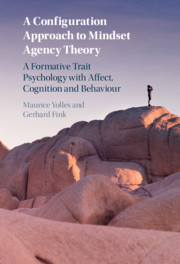 A Configuration Approach to Mindset Agency Theory
A Configuration Approach to Mindset Agency Theory Book contents
- A Configuration Approach to Mindset Agency Theory
- A Configuration Approach to Mindset Agency Theory
- Copyright page
- Contents
- Figures
- Tables
- Foreword
- Introduction
- Part I Cybernetic Sociopsychology and Agency
- Chapter 1 Mindset Agency Theory – an Underview
- Chapter 2 An Exercise in Configuration
- Chapter 3 Mindscapes Theory and Balanced Personality
- Chapter 4 Normative Personalities
- Chapter 5 Understanding Formative Traits and Behaviour
- Summarising Narrative for Part I
- Part II From Cognition to Affect
- Part III Modelling Identity Types through Agency
- Part IV Formal Possibilities in Mindset Agency Theory
- Part V Conclusion
- Book part
- Notes
- Glossary
- References
- Index
Chapter 3 - Mindscapes Theory and Balanced Personality
from Part I - Cybernetic Sociopsychology and Agency
Published online by Cambridge University Press: 28 July 2021
- A Configuration Approach to Mindset Agency Theory
- A Configuration Approach to Mindset Agency Theory
- Copyright page
- Contents
- Figures
- Tables
- Foreword
- Introduction
- Part I Cybernetic Sociopsychology and Agency
- Chapter 1 Mindset Agency Theory – an Underview
- Chapter 2 An Exercise in Configuration
- Chapter 3 Mindscapes Theory and Balanced Personality
- Chapter 4 Normative Personalities
- Chapter 5 Understanding Formative Traits and Behaviour
- Summarising Narrative for Part I
- Part II From Cognition to Affect
- Part III Modelling Identity Types through Agency
- Part IV Formal Possibilities in Mindset Agency Theory
- Part V Conclusion
- Book part
- Notes
- Glossary
- References
- Index
Summary
The Myers-Briggs Type Indicator (MBTI) and Maruyama’s Mindscape Theory should not be considered as competing theoretical configurations because their terms of reference are different. Here, it will be shown how adaptive processes can occur that enable them to be coincident. To do this they must be able to operate in a common frame of reference enabling them to be mutually configured, but this requires a common dimensionality established through the definition of relatable trait spaces. A meta-analysis enabling this to occur will be provided.
- Type
- Chapter
- Information
- A Configuration Approach to Mindset Agency TheoryA Formative Trait Psychology with Affect, Cognition and Behaviour, pp. 100 - 133Publisher: Cambridge University PressPrint publication year: 2021
